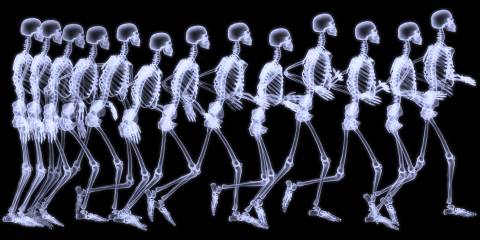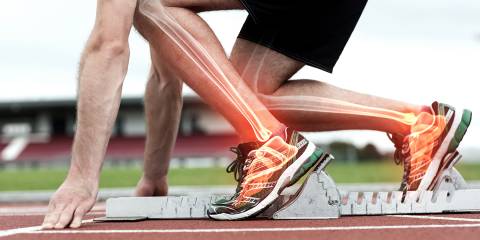Nutrition and Supplements for Bone Health
-
Vitamins
Without certain vitamins, minerals can’t do their job of binding to the tissue that forms into bone.
-
Vitamin D
One of the most important vitamins for healthy bones, Vitamin D is needed to prevent serious risks.
Production of this vitamin happens naturally when the cholesterol in our skin is converted into D by the sun’s rays.
About 10 to 15 minutes of daily sun exposure yields the equivalent of 400 IU of vitamin D, but if sunlight hours are abbreviated or you’re avoiding the sun, supplemental D is a good alternative.
Dietary sources include:
- butter
- liver
- fatty fish (salmon, tuna, mackerel)
- cod liver oil
- egg yolks
-
Vitamin K
Without this group of compounds, our bones would resemble dusty chalk. According to James Balch, MD, vitamin K “is essential for bone formation and repair.”
A preferable alternative to taking vitamin K directly is to supplement your diet with a healthy dose of intestinal flora, or probiotics, available in capsules or liquid and in live-culture yogurt.
Postmenopausal women, who are particularly at risk of osteoporosis due to hormonal shifts, may have lower levels of K.
-
-
Minerals
-
Calcium
Calcium is the foundation of good bone health. It's readily available in supplement form, and foods such as:
- broccoli
- carrots
- cauliflower
- dairy products
The problem here is one of nutrient absorption, with some researchers suggesting that only 10 percent of the mineral being absorbed from our diet or supplements.
When supplementing, look for “whole food” concentrates in calcium supplements, which will be easier to assimilate.
But remember:
- Your body can only absorb about 500 mg of calcium at a time.
- Unless it is taken with magnesium, most calcium will either:
- move through the body without being absorbed
- wind up as kidney stones or gallstones
-
Magnesium
Some sources say that the real cause of osteoporosis is insufficient magnesium. One study indicates that most women over the age of 40 have low levels of this mineral.
About 60 percent of our body’s magnesium resides in the bones, and it is a crucial partner with calcium, taken in the right proportion.
Finding that balance is key—with too little magnesium, calcium will be excreted rather than absorbed.
-
Phosphorus
Another key player in the delicate calcium balance. 80 percent of our body’s phosphorus is found in bones and teeth.
However, too much of this mineral can keep calcium from being absorbed!
This is one of the main reasons that drinking soft drinks can affect bone health: the phosphates in soda compete with calcium.
-
Boron
An important factor in bone metabolism, boron helps facilitate the absorption and balance of:
- calcium
- magnesium
- phosphorus
Boron is available as an individual supplement, but look for it in combination with other minerals (such as calcium and magnesium) too.
-
-
Herbs and Extracts
-
Resveratrol
Older, overweight men strengthened their bones by taking 1,000 milligrams of resveratrol.
That’s a fairly high daily dose, but this group of men was at significant risk of developing osteoporosis due to low-grade inflammation caused by metabolic syndrome (a cluster of risk factors linked to diabetes and heart disease).
The supplement stimulated bone formation and mineralization during the 16-week trial.
-





